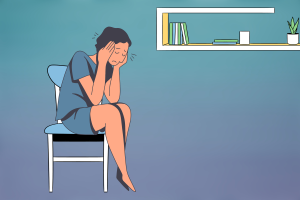Why Do I Have a Headache?
Whether it’s a migraine or tension, almost everyone suffers headaches at some point in their life. Headache is discomfort or pain felt in the head and may be mild, annoying, moderate to severe, or even debilitating. Headaches are a common affliction, but knowledge of the reasons for headaches needling to their types and cures can be an essential device in having attacks under management.
Causes of Headaches
This can be due to a variety of causes, such as lifestyle factors or some underlying medical disorder. These happen when certain pain-sensitive structures of the head like nerves, blood vessels, muscles, or nearby tissues awake. There are primary headaches stemming from structural or functional problems within the brain and secondary headaches originating from outside the body.
Primary headaches are not a symptom of an underlying medical condition but result from overactivity or problems with pain-sensitive structures in the head. This includes tension, migraines and cluster headaches. In contrast, secondary headaches are a symptom of something more serious, like an infection, sinus issues or head trauma. Headaches can be worsened or brought on by some environmental or behavioral factors, like stress, dehydration, lack of sleep, or certain foods.
Stress: Stress is one of the main causes of headaches, especially stress headaches. Muscle Strain Neck and Scalp The neck and scalp muscles can get strained from stressful situations, overexertion, or poor posture — resulting in discomfort or pain. Likewise, dehydration lessens the body’s ability to function optimally in providing blood flow to the brain and other organs, which typically results in headaches. Lifestyle habits like high caffeine intake or not sleeping at regular hours.
Secondary headaches are normally associated with infections, high blood pressure, or other health illnesses. Sinus infections, for example, inflame and put pressure in the sinus cavities, leading to a particular type of headache. In worse scenarios, headaches may be a sign of severe health problems like brain tumors or aneurysms. Knowing when a headache is a sign of something much worse is very important!
Types of Headaches
Headaches fall into general categories, triggered by different things, happening for various reasons, and presenting in unique ways. The three most notorious forms are tension headaches, migraines, and cluster headaches.
The most common type of headache, tension headaches are characterized by a dull or aching sense of tightness surrounding the forehead, temples, or back of the head. Classical headache is mild to moderate in degree and does not elicit associated phenomena such as nausea or photographs. Stress, fatigue, and muscle tension in the head and neck usually lead to tension headaches.
A migraine can be described as a severe and more debilitating tension headache, usually with a throbbing or pulsing pain on one side of the head. Often, migraines come with nausea, vomiting, and sensitivity to light, noise, or odors. These can be preceded by an aura, a type of neurological symptom like visual disturbances or tingling sensations.
Cluster headaches are a rare but very painful type of headache that usually happens in cyclical patterns, or “clusters.” They produce crippling, stabbing pain around one of the eyes or one side of the head and usually come with tears, redness, or nasal congestion. In cluster headaches, periods of weeks to months, the headaches come and go with the remission phase when no headache occurs for a period. The exact origin of cluster headaches is not completely understood, but they are thought to involve perturbations in the hypothalamus.
There are also less common kinds, like sinus headaches—brought on by a sinus infection or allergies—and rebound headaches, which develop from using pain-relief medicines too much. Another type is hormonal headaches, which are primarily related to changes in hormone levels due to menstruation and other life stages such as pregnancy and menopause.
Remedies for Headaches
People should treat a headache depending on the type and the underlying cause of it. Headaches are common, and in most cases they can be treated easily with home remedies, lifestyle changes, and common analgesics [over-the-counter pain relief medications]. That said, some headaches are more serious and need medical help.
In less severe headaches, much of the time hydration and rest are the best solutions. Hydration headaches can usually be fixed with water, and tension headaches will typically go away if someone stops doing a stressful task or takes a nap to sleep it off. Depending on the kind of headache, a cold compress can reduce discomfort when applied to the forehead or a warm compress to the neck.
Many types of headaches respond well to over-the-counter medications, such as acetaminophen or ibuprofen, especially tension headaches and migraines. These medications should be taken only infrequently to prevent rebound headaches. In the case of migraines, medications such as triptans can be used to alleviate a migraine attack by acting on the processes related to migraines.
A very big component of preventing headaches is simply lifestyle adjustments. Taking regular sleep, having a healthy diet, and controlling stress with relaxation methods such as meditation or yoga will help you to prevent headaches in terms of frequency and severity. Charting your particular
Headache triggers, such as foods to avoid, strong odors, or bright lights, can be useful.
When headaches are severe or persistent, prescription medications and alternative therapies may be required. Beta-blockers, antidepressants, or anti-seizure drugs are examples of preventive medications to prevent chronic migraine headaches from occurring. Complementary therapies, such as acupuncture, biofeedback, and chiropractic care, may help certain types of headaches.
For secondary headaches, treating the underlying condition is key. Duh, if, in the case of a sinus infection, you get antibiotics or decongestants, then your headache will disappear. In the same way, treating high blood pressure with the appropriate medications can stop headaches due to hypertension. Very rarely, headaches due to structural lesions or tumors may need surgical treatment.
When to Seek Medical Help
Although most headaches are non-serious and can be cared for at home, some symptoms may require emergency action. These are sudden and intense headaches that may feel like someone hit your head with a hammer; they come on very fast, termed “thunderclap”-like headaches, and can be an indication of a serious problem (e.g., brain aneurysm). Other churning signs are headaches related to disarray, vision changes, brevity, or problem compartment speaking; these could be indications of a stroke or added neurological condition.
Headaches that do not respond to treatment, get worse over time, or are accompanied by other symptoms such as fever, stiff neck, or vomiting should also be looked at by the provider. Headaches after a head injury should have an immediate evaluation by a doctor in order to exclude concussions or other complications.







Leave a Reply